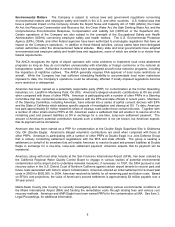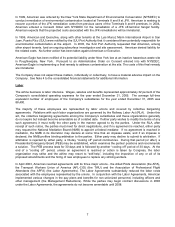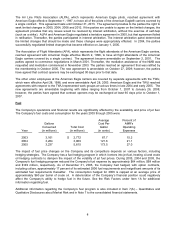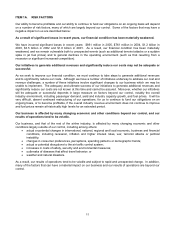American Airlines 2005 Annual Report Download - page 19
Download and view the complete annual report
Please find page 19 of the 2005 American Airlines annual report below. You can navigate through the pages in the report by either clicking on the pages listed below, or by using the keyword search tool below to find specific information within the annual report.16
We could be adversely affected by an outbreak of a disease that affects travel behavior.
In 2003, there was an outbreak of Severe Acute Respiratory Syndrome (SARS), which primarily had an adverse
impact on our Asia operations. More recently, there have been concerns about a potential outbreak of avian flu.
If there were another outbreak of a disease (such as SARS or avian flu) that affects travel behavior, it could have
a material adverse impact on us.
We could be adversely affected if we are unable to maintain satisfactory relations with any unionized or
other employee work group.
Our operations could be adversely affected if we fail to maintain satisfactory relations with any labor union
representing our employees. In addition, any dispute we have with, or any disruption by, an employee work
group (outside the confines of a collective bargaining agreement) could adversely impact us. Moreover, one of
the fundamental tenets of our strategic Turnaround Plan is increased union and employee involvement in our
operations. To the extent we are unable to maintain satisfactory relations with any unionized or other employee
work group, our ability to execute our strategic plans would be adversely affected.
Our insurance costs have increased substantially and further increases in insurance costs or reductions
in coverage could have an adverse impact on us.
We carry insurance for public liability, passenger liability, property damage and all-risk coverage for damage to
our aircraft. As a result of the Terrorist Attacks, aviation insurers significantly reduced the amount of insurance
coverage available to commercial air carriers for liability to persons other than employees or passengers for
claims resulting from acts of terrorism, war or similar events (war-risk coverage). At the same time, these insurers
significantly increased the premiums for aviation insurance in general.
The U.S. government has agreed to provide commercial war-risk insurance for U.S. based airlines until August
31, 2006, covering losses to employees, passengers, third parties and aircraft. In addition, the Secretary of
Transportation may extend the policy until December 31, 2006, at his discretion. However, there is no assurance
that it will be extended. If the U.S. government does not extend the policy beyond August 31, 2006, we will
attempt to purchase similar coverage with narrower scope from commercial insurers at an additional cost. To the
extent this coverage is not available at commercially reasonable rates, we would be adversely affected.
While the price of commercial insurance has declined since the premium increase immediately after the Terrorist
Attacks, in the event commercial insurance carriers further reduce the amount of insurance coverage available to
us, or significantly increase its cost, we would be adversely affected.
We may be unable to retain key management personnel.
Since the Terrorist Attacks, several of our key management employees have elected to retire early or leave for
more financially favorable opportunities at other companies. There can be no assurance that we will be able to
retain our key management employees. Any inability to retain our key management employees, or attract and
retain additional qualified management employees, could have a negative impact on us.
We could be adversely affected by a failure or disruption of our computer, communications or other
technology systems.
We are increasingly dependent on technology to operate our business. The computer and communications
systems on which we rely could be disrupted due to events beyond our control, including natural disasters, power
failures, terrorist attacks, equipment failures, software failures and computer viruses and hackers. We have taken
certain steps to help reduce the risk of some (but not all) of these potential disruptions. There can be no
assurance, however, that the measures we have taken are adequate to prevent or remedy disruptions or failures
of these systems. Any substantial or repeated failure of these systems could impact our operations and customer
service, result in the loss of important data, loss of revenues, increased costs and generally harm our business.
Moreover, a catastrophic failure of certain of our vital systems (which we believe is a remote possibility) could limit
our ability to operate our flights for an indefinite period of time, which would have a material adverse impact on
our operations and our business.
























